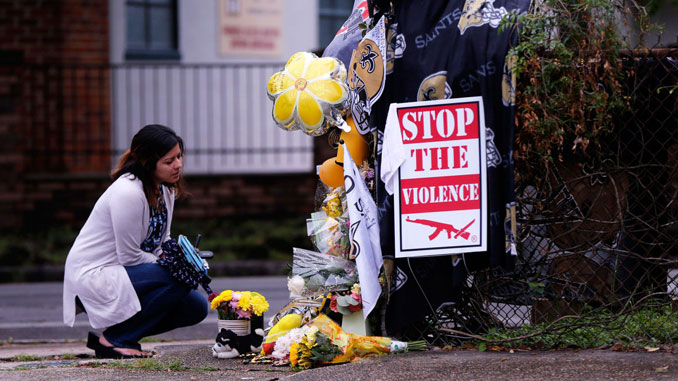Crime and Violence in New Orleans
Edwin Buggage Editor-in-Chief Data News Weekly Violent Crime Plagues New Orleans In the City of New Orleans, violent crime continues to be on the rise. This phenomenon is causing alarm for many as summer is [...]

Edwin Buggage Editor-in-Chief Data News Weekly
Violent Crime Plagues New Orleans
In the City of New Orleans, violent crime continues to be on the rise. This phenomenon is causing alarm for many as summer is approaching, where there is usually a spike in crime. All are looking for solutions both on a macro and micro level. Recently, leaders from across nine parishes in Louisiana came together with Crimestoppers raising the rewards to get citizens to assist in getting those who pose a threat to the community off the street. While many of these approaches deal with the symptoms, they do not get to the root causes of crime and violence in the City of New Orleans.
Crime and violence are a not simply a criminal justice issue for those involved in law enforcement, but more broadly it is a social problem where various reasons for why people choose crime and violence over others choosing to not commit crime. For this is not to diminish the efforts of those who are in leadership positions, but it is necessary to shift the focus from getting tough on crime only, but to consider how to prevent the citizens of New Orleans, particularly Black males to consider other options to crime and violence.
Louisiana: The Prison Capital of the world
The State of Louisiana, per capita has the largest prison population in the world; imprisoning 1094 of every 100,000 residents according to a 2019 report. A compelling and troubling fact is that the majority of those imprisoned are Black males. For example, in the City of New Orleans, according to a 2017 study by The Vera Institute, Black males between the ages of 15-84, accounted for 26% of the city’s population, but 81% of those incarcerated. It must be asked what accounts for these disparities?
For policymakers it is important to study and explore and compare the link between African American males in New Orleans to determine what factors links led them down the road to prison. Conversely, examine the links between positive school, family and community experiences that led others down alternative roads thus avoiding the Criminal Justice System.
This more comprehensive and holistic approach can contribute to the body of work already launched that can assist in informing public policy makers and other stakeholders on approaches that could reduce the number of Black males entering the prison/Criminal Justice System, and potentially suffice in improving their odds for successful outcomes in society.
The Link Between Education and Opportunity
In Louisiana and across the United States, African American males continue to lead in various negative educational statistical categories: school achievement, lower high school graduation rates, and suspensions. Reasons are embedded in the legacy of slavery, segregation, and institutional racism that continues to relegate Black males to second-class treatment in the United States. Similarly, this is mirrored in classrooms across the United States, particularly in urban, rural and resource poor communities.
The relationship between penal institutions and under resourced schools have been documented by scholars and advocacy groups. In a 2015 study by the Children’s Defense Fund states 45.7% of children in Louisiana are growing up in economic poverty, a factor that impacts negative educational outcomes that often lead to imprisonment of African American males. According to the National Association for The Advancement of Colored People (NAACP) Legal Defense Fund (LDF), school reform models (zero tolerance) where students are expelled and suspended in schools. This and other school reform policies are based on punitive vs. preventive measures for youth are leading to the over incarceration.
Black Boys and Men Matter
School reform models such as zero tolerance leads to Black males being suspended at three times the rate of White males and contributes to a pattern that leads to the school-to-prison pipeline. Indeed, a disturbing phenomenon, but this does not paint the entire picture of Black males in America. Conversely, Black males graduating from high school, attending college or trade schools, gainfully employed, and being responsible parents and husbands.
Moreover, these stereotypes prefiguring low achievement for Black males does not denote inherent intellectual inferiority, but structural bias and barriers leading to poor outcomes for a portion of resource poor African American males. We must begin to seek and explore links between high and low Black male achievement, and strategies to remedy this from occurring to guide best practices to produce better outcomes for African American males in school and society.
Reducing Crime and Violence: It Will Take All of Us
Where answers do not lie in simply hiring more police officers, getting more convictions, and getting tough on crime. It is about investing in families, communities, and bringing resources that can increase the odds of success to the citizens of New Orleans. Particularly, African American males, for they tend to have the most adverse outcomes not just in New Orleans, but all over the United States. Indeed, this is a problem that has been here before any of the policymakers who are in office now held these seats of power. Also, it is not solely their responsibilities to solve these problems, but it is up to all the citizens to work towards solutions by doing their part whatever that is to contribute to make New Orleans a better and safer City for all to prosper and thrive.







